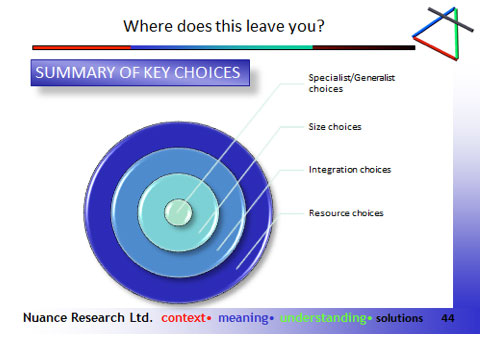Neil McPhee
As a basic and somewhat obvious starting point, it is largely self-evident that qualitative research, and recruitment for it, does, and must, reflect the society in which it takes place. Its values, morals and conventions must act as the foundation for all that we do, otherwise the values of the research/er dominate and subsume those of the target audiences whom we study.
However, as society changes, does qualitative recruitment (have to) change too? This seems to pose the fundamental issue, and challenge, whether we accede to the over-ride of societal values or whether we strive to maintain some previously standards, approaches and values. To simplify the argument hugely, if research takes place in a society which is (say) homophobic, intolerant of dissent and politically repressed/not free, does that mean that research should adopt a similar approach and recruit only targets who reflect this limited outlook? Or should research reflect all elements of society (subject to the appropriate definition of who constitutes a relevant target audience)?
This is a very simplified argument but hopefully it illustrates the fundamental core of the issue.
In 1972, I started in market research and recruitment in the UK was in the hands mainly of ‘gangs’ of area supervisors and their teams, often, though with some honourable exceptions, made up of middle class women. As was the norm back then, projects were conducted at a fairly leisurely pace, by today’s standards, briefs were received often by post and/or phone and we interviewed far more often in recruiters’ front rooms, perched on a mis-match of dining room chairs and garden furniture.
Audio recordings were taken on reel-to-reel tape recorders, studios were few and far between, and recruitment was its infancy. We did however have in our minds sound basic principles of social science about the whole business and my own memory is of an industry solidly grounded in academic knowledge of the subjects (psychology, anthropology, ethnography etc) where we sought to adapt these to a more commercial context.
My own personal experiences reflect this. Having graduated with a degree in politics/ sociology/ economics in June 1972 within 3 weeks I was working in a market research agency, applying all these academic roots to commercial and social research projects, and I took and applied the standards which I had been taught, seriously, as I am sure most of us did. Clients came to us as experts in such applications and we did our best to provide appropriate answers.
Then in the 1980’s it all took off in qualitative research and we all got super busy. Pressures to complete fast, on –time, etc rose, and more and more of the larger agencies bought more and more of the specialists, and it seemed began using pretty much whoever was available to do the moderation (I met some Quant execs who had been told to ‘go and run a few groups’ by some larger agencies), as the impetus was to make money from qualitative research as it made better margins, quicker, that quantitative work. This had the inevitable consequence of placing more pressure on recruitment and standards slipped. We had IQCS, ISO’s, etc, but while these did address some issues of field briefings, tape labeling and sign-off on topic guide changes, it didn’t really solve the problems and group groupies and out-of-quota respondents were all-too-common, along with some heinous examples of recruiters briefing respondents on what they should/should not have bought/used etc.
The research establishment hasn’t and didn’t always care much either about qualitative research and certainly the MRS has always seemed somewhat unsure about how to handle us. AQR in the UK, and QRCA in the US plus some in other countries, are about the main focal points aside from individuals themselves, which I guess is inevitable given that qualitative research accounts for less than 20% worldwide, of research spend. In this context, it may not be a surprise that few recruiters are exposed to much of the background thinking and key concepts to help then apply our requirements in the cold hard reality of persuading respondents to attend interviews or take part in ethnography etc.
The early years of my research career were also characterised by a real lack of understanding amongst respondents as to what we did and why we did it, as well as a lack of understanding of “marketing”.
Fast forward over 40 years
By contrast (now) not only is marketing well (and cynically) understood, but everyone, clients and members of the public believe themselves to be experts in body language decoding.
Qualitative research is a still minority sport, with, ESOMAR figures, showing some 17% of research spend to be on qualitative research and, my estimates, only around 20% of this money spent on recruitment. This means that recruitment faces a very real problem, on the one hand seeking to respond to agency/client requests, within the context of increased competition from both recognised fieldwork providers and new/non-traditional providers, while at the same time working to tight margins, increased overheads, regulation, holiday pay, privacy rules etc on the other. The commercial failure of several well-known fieldwork providers in the last few years has proven how hard it is and with the increased emphasis on speed and (low) costs now established as the driving forces within research markets, it is hardly to be wondered at that field is actively seeking cheaper and faster ways of providing respondents.
This is compounded by the breaking down of the traditional market structures where we find clients (direct and agency, moderator and others) going both to supervisors and recruiters directly, as well as through some nominal field agency structure, further breaking down and fragmenting the market.
MR 2014 > and industry re-invention
While the origins of these issues are long standing within the industry, there is no doubt that recent developments, which may be summarised under the heading of the New MR movement, are at least making the problems worse if not actually causing them. The impetus towards digital/web based research and recruitment, the push for self/auto completion and ethnography etc, plus the concepts of web recruitment, panel and database usage etc, have made the recruitment task harder to make commercial.
What’s important today in qualitative research? Well, my argument is the speed, low cost and instant feedback all drive the market now, and that the traditional “virtues” of planning, thought, and analysis have largely gone, in favour of the “New MR” culture. Pragmatism in place of rigour, and “client is always right” focus over our own expertise have become the new business practices exchanges and the contribution of procurement departments, whose self-proclaimed task is to reduce costs, often ignoring (or more likely, being unconscious of) the implications for quality standards.
Recruitment must acknowledge this shift, meaning that recruitment is maybe now judged by different standards! Where quality of staff, personal briefings etc were the norm, maybe presentation of fieldwork quotes, standards of studio catering, weekend office staffing etc, may become the new yardsticks.
Where does this leave you, as Fieldwork providers?
My view is that only by engaging one or more traditional business responses can field hope to survive profitably. In summary, these can be grouped as 1) specialism or generalism, 2) size which follows from 1, 3) integration/mergers/acquisitions and 4) resources.
- Specialist/generalist
This choice of positioning is a classic response to the market and faces us all. Jack of all trades or specialist? Large or small? These go hand in hand and may involve fieldwork agencies in difficult decisions regarding investment in new staff, or resources, or equally in shrinking size, moving to smaller premises, reducing staff etc.
- Integration with others
With the increase in international market/research design, it seems inescapable that fieldwork providers will need increasingly to handle multi market projects, unless of course they position themselves as UK/country specific providers. This will involve language, finance, legal and other specialist resources, and may be best resolved by judicious merging/contracting out to a combination of overseas providers of country-specific specialists.
- Resource issues
As with all businesses, decisions must consequently be made about which resources will be required, in-house, and which bought-in, if offered at all. The questions regarding specialisation are hard in a highly competitive market, and there are plentiful examples of field agencies offering recruitment to which they are clearly unsuited by experience or resources. Pharma and B2B are obvious examples, and these in my own personal experience are fraught with problems where recruitment providers are not well versed in the difficulties inherent in these sectors. Recruiting a mid-market shopper is one thing, recruiting a Neurologist or a Parkinson’s disease patient, quite another task.
This leads back to core questions of specialisation and resource provision/integration issues. Certainly it is unlikely that many mid or smaller sized field agencies will be able to justify in-house legal specialists, financial skills capable of multi-country/currency dealings, or language skills for the same reasons. Since all of these are/will become highly important over the short to mid-term, it seems that these may be at the heart of many resource decisions.
Conclusion
Fieldwork is central to the current formulation of the Qualitative sector as without the right people to interview, we don’t have a product! Even with auto/self-selection and completion, we still need the raw materials. It is catastrophically short-sighted to skimp on recruitment as many multi-million dollar decisions may well rest, in part, on the quality of Qualitative data provided and the wrong respondents and uncertain raw data will provide a foundation incapable of reliable interpretation.
We need strong, professional and responsive field recruitment and we should be prepared to pay for it (and indeed to demand it). Agency structures will however need to same professional management as the clients, agency or otherwise, whom they serve.
So, in short, it is my fear we may be in danger of “changing” fieldwork standards, in the face of pressure from speed/cost and the new methodological orthodoxy. This of course parallels the reduction in depth and moderation/analytical skills in Qualitative research more generally. The emphasis on approved/timed topic guides, on speed of results delivery etc, are I fear reducing the potential value and impact of true “insights”, and I am not alone in this fear. This is a link to John Griffith’s recent blog comparing current research to meniscus:
“…superficial times where frankly I wish a new agency would call itself Meniscus because that’s how shallow customer understanding has become. Data has multiplied. Depth has vanished”
Let us be wary of adopting the New MR without at least debating what we lose by its adoption. Without quality standards we are relegated to the provision of random opinions, without evidence or analysis to back it up. On this platform, it is only a matter of time before research makes a really big error, and it will be we researchers who shoulder the blame, whether fairly or unfairly.
Professional standards are there for a reason: let us uphold them.
Neil McPhee is Managing Director at Nuance Research Ltd



